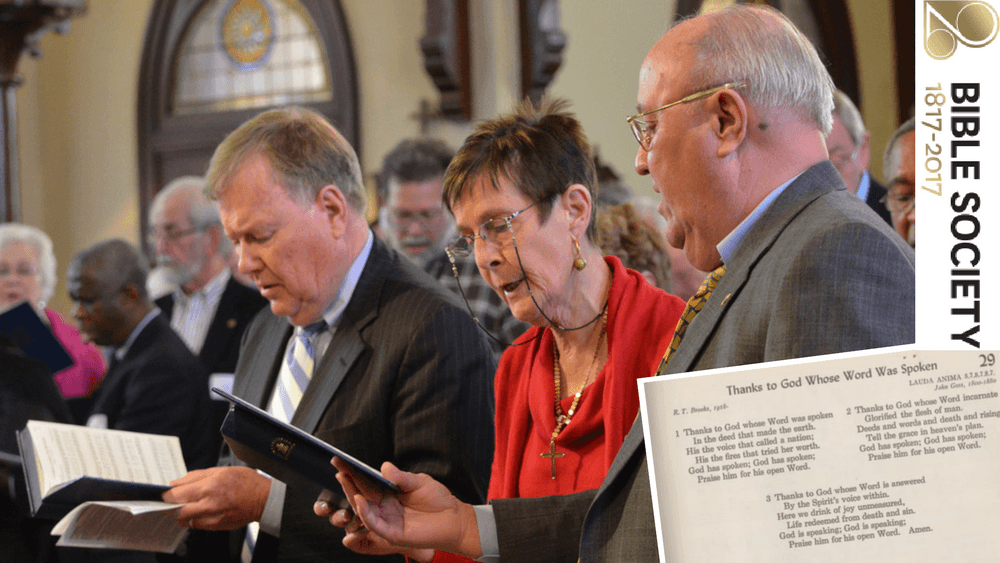Most of the great hymns about the Bible happen to have been specially written for the great milestones of the original Bible Society, says Bible Society Australia historian John Harris.
As Bible Society Australia celebrates its bicentenary this week with a new song, Harris recalled some of the great hymns that celebrated the founding of the British and Foreign Bible Society (BFBS) in 1804, the mother of the world’s Bible Societies.
Your Word, written by Hillsong songwriter Chris Davenport, features on Hillsong’s latest album Let There Be Light. It was sung at the National Celebration of the Bible at Hillsong churches over the weekend.
Harris believes the best Bible hymn ever written was composed for BFBS’s 150th anniversary. He says Thanks to God whose Word was Spoken encompasses not only the power and efficacy of the word but its translation and publishing also.
Here is the first verse:
Thanks to God whose word was spoken
In the deed that made the earth.
His the voice that called a nation;
His the fires that tried her worth.
God has spoken, God has spoken:
Praise God for his open word!
Praise God for his open word!
Composed by United Reformed Church minister and BBC broadcaster Reginald Brooks, this is the only truly Bible Society hymn to have made it into modern Hymn Books and is sung to various tunes. Harris says his church in Canberra usually sings it to the popular “Bread of Heaven” tune known as Cwm Rhondda (Guide me O thou great Redeemer).
Just like Bible Society Australia, BFBS was founded on March 7, but 13 years earlier. So in March 1854, it held its 50th anniversary celebration at St Paul’s Cathedral, London. For the occasion, popular hymn-writer Rev. Hugh Sowell wrote a special hymn, Lord of all Power and Might, which became known as the Jubilee Hymn.
“[There was a gift] of £2000, a very large sum approaching $1 million in today’s terms, to provide Bibles for troops fighting overseas.” – John Harris
“This hymn has not survived into the most modern Hymn Books but it has very good words and can be sung to some well-known tunes,” notes Harris.
The centenary celebration of the BFBS was also held at St Paul’s Cathedral, London, in March 1904. Again, a special hymn was composed, this time by Bible Society scholar and librarian, H.C. Moule. Harris believes We Thank Thee for a Hundred Years has excellent sentiments, acknowledging failures as well as successes, but looking forward to God’s unfailing guidance in the future.
“As far as I can work out, the anniversaries up to the Sesquicentenary in 1954 were also celebrated in Australia. During that time all of the colonial – later state – Bible Societies were not independent organisations but were rather local auxiliaries of the BFBS and therefore celebrating the same founding date.”
Some state societies did celebrate their own local centenaries but Harris knows of only one special hymn being composed for them.
“To young people like me it was amazing – the first Bible we had seen in modern English!” – John Harris
In 1917, well-known war poet Nicholas Cocks wrote Eternal Spirit, God in Men for the centenary of the NSW Auxiliary of the Bible Society, but it was never published.
“I remember hearing it sung at a Bible Society event when I was a child and my father had a copy. It had some mention of the war,” says Harris. “We need to remember that, in 1917, Australians were still fighting and dying in the Great War and this cast a shadow over celebrations. The centenary was held in Sydney Town Hall, across the street from Bible House NSW.
“There were choirs and pageants but there were necessarily serious moments, the most solemn but inspiring being the gift of £2000, a very large sum approaching $1 million in today’s terms, to provide Bibles for troops fighting overseas. It was collected entirely by children using the little Bible Society moneyboxes.”
Harris cherishes a memory of when the first Bible in modern English arrived in Australia in 1961. This milestone event was a joint project of the British churches, the Bible Society and the universities of Oxford and Cambridge.
“To young people like me it was amazing – the first Bible we had seen in modern English!” says Harris.
When a Bible Society field worker gave a young minister, Rev Timothy Dudley-Smith, an advance review copy of the New English Bible New Testament, he opened it at Luke Chapter 1 and read the first line of Mary’s Song (The Magnificat).
In the familiar King James Version, the verse read “My soul doth magnify the Lord” but in the New English Bible it read “Tell out, my soul, the greatness of the Lord!” Dudley-Smith exclaimed “that should be set to music,” and that afternoon he wrote the stirring hymn Tell out, my Soul, the Greatness of the Lord.
“Bishop Timothy Dudley-Smith has written many hymns but none greater than this one,” says Harris.


